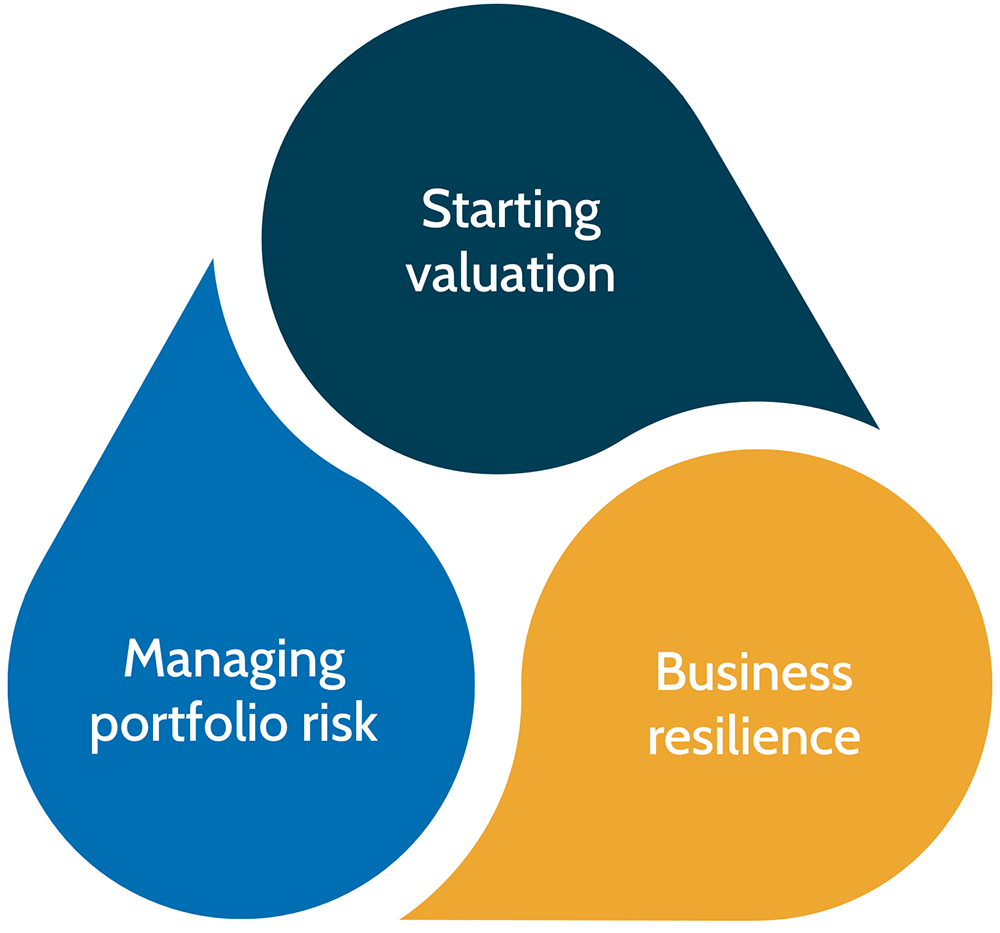
We are pragmatic value investment managers who specialise in global and emerging markets shares. Our goal is to deliver attractive risk adjusted returns.
As active managers, we are unconstrained by an index and not led by the erratic sentiments that drive activity in the markets. Instead, we focus on the opportunities that are revealed by a close scrutiny of industry and business cycles, as well as the structural changes and the socio/macroeconomic forces that shape the future of the companies in which we may choose to invest.
We build high conviction portfolios of at least 30 stocks. Such careful selection, we believe, enables us to outperform the market over a three to five-year period while softening the effects of unexpected volatility along the way.
There are three critical considerations that shape our investment process. They are; starting valuation, an assessment of business resilience, and management of portfolio risk.
Value lies not simply in the price you pay for an asset, it lies within the potential of what that business can become. It’s by paying less than the intrinsic value of the business that we can create a ‘margin of safety’ for our investors and protect their capital from downdrafts in the market.
We believe the most promising opportunities for Antipodes lie within companies that have more than two billion dollars market capitalisation, and this gives us a universe of about 4000 businesses to explore.
So how do we identify quality businesses that have been undervalued and overlooked?
Experience tells us that the wisdom of the crowd is prone to exaggeration. Change leads to reaction and often to over-reaction. We call this ‘irrational extrapolation’ and it compels us to study three types of change that will impact the businesses we might consider buying.
First, we look at cyclical change. It’s common for successful and profitable businesses to attract new competitors which in turn leads to an expansion of their market. In some instances, this might be a good turn of events. But a small change in demand can quickly destabilise the industry, leading to excessive price competition and a shake-out phase which would have an immediate effect on value.
Second, we investigate structural issues within the industry. For example, we might find that a powerful incumbent has become complacent and created opportunities for competitors. Again, this would prejudice our view of intrinsic value.
Lastly, we explore the broad socio/macroeconomic changes that might have an impact on the company’s fortunes. These forces can take many forms – a changing regulatory environment, demographic change, currency fluctuations, political instability and so on. It requires a very disciplined and experienced fundamental approach to determine whether the impact of these external conditions will have a temporary or permanent effect on the value of the business.
Irrational extrapolation, the tendency of markets to over-react to change, creates the opportunity that allows us to buy great businesses at a great price.

“In markets led by sentiment, change leads to reaction and often over-reaction. We call this ‘irrational extrapolation’ and it creates an opportunity for the cool-headed investor.”
James Rodda, Portfolio Manager
While we would describe resilience as the ability to withstand change and sustain a competitive advantage, we’re not just looking for resilient businesses. We’re looking for resilient investments.
We have total control of what we pay for a business. But that alone is insufficient. An investment case can never depend on one sole factor to deliver a successful outcome as that would risk a single point of failure, something we always seek to avoid.
Our philosophy is to assess value within the context of multiple ways of winning. We’re looking for multiple drivers that can contribute to a successful outcome. These might include favourable competitive dynamics, product cycles, management actions, regulatory controls and macro/quantitative factors. This is where the experience of our team and the discipline of our fundamental analysis proves to be so valuable. If our assessment of a single driver is misplaced, we enjoy the confidence of knowing that the remaining drivers can act in our favour.

“We’re not just looking for resilient businesses. We’re looking for resilient investments. Over the long term, the difference is critical.”
Graham Hay, Portfolio Manager
As well as creating a margin of safety around the stocks we select, we are vigilant in managing risk at the portfolio level. We take a qualitative and quantitative approach in measuring and controlling the build-up of similarities in the portfolio so that we can limit our exposure to shocks and downturns.
We achieve this protective form of diversification by grouping stocks that behave similarly into clusters. We then ensure that each of these concentrated areas of risk is not over-represented within the portfolio. As we’re only looking at a select number of opportunities within a universe of over 4000 global companies, we can do this with great precision.
Short-selling is another mechanism we can employ for managing risk and meets three strategic requirements. It can help us outperform the index, it can offset specific risks and it can offer us protection from those unforeseeable events that, while unlikely, have a seismic effect on markets – otherwise known as ‘tail risk’.
For example, we might find a successful incumbent that has lost focus or been disrupted by new entrants to the market. Such a company is teetering at the tipping point between exuberance and shake out and would be a target for this strategy.
Or it might be that the disruptors in that market are now overpriced. Excessive optimism about their prospects is driving up their share prices and failing to acknowledge the weakness of their underlying business models. So, they could be a target. In either instance, short-selling offers us the opportunity to manage portfolio risk by making money in both directions – when the share price of a business is going down as well as going up.
Given that we pursue a global strategy, currency risk is also a factor that plays a significant role in our decision making. When we buy a stock listed internationally, we’re also buying a foreign currency. If our fundamental evaluation model suggests that the currency is significantly overvalued, we will hedge out of that currency and into one that we feel is more attractive.

“We achieve a protective form of diversification by grouping stocks that behave similarly into ‘clusters’ and then ensure that they are not over-represented within the portfolio.”
Rameez Sadikot, Portfolio Manager
Our performance driven investment team excels in finding undervalued stocks and building portfolios with a strong focus on generating attractive risk-adjusted returns.
Read more >We act for the benefit of our investors while actively contributing to the development of a stable, sustainable and inclusive global economy.
Read more >As our investment team continues to grow, we’re always looking for talented recruits to bring their skills, energy and fresh perspectives.
Read more >